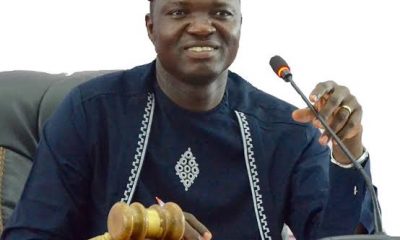Health
Pediatrician Explains Dangers of ‘Hidden Hunger’ in Children

Dr Olufemi Olaniyi, a Consultant Pediatrician and Neonatologist, has warned about the dangers of “hidden hunger” – micronutrient deficiencies – and their negative consequences on children’s optimal growth and development.
Olaniyi, a Consultant at the Department of Child Health, University of Benin Teaching Hospital, gave the warning during an interview with the News Agency of Nigeria in Benin on Monday.
He explained that hidden hunger was a form of malnutrition that did not present with obvious symptoms in children.
“Hidden Hunger is caused by lack of adequate qualities of micro nutrients like iron, zinc and iodine in a child’s food.
“A lack of major calories like protein and carbohydrates is visible in a child, but micronutrient deficiencies can be “hidden” even when a child is eating large quantities of food,” he said.
The pediatrician noted that micronutrients were essential for proper physical and cognitive development.
He said: “If a child is not getting enough iron, their blood might become short and their blood cells might be smaller than they ought to be.
“Such children may have poor cognitive functions. They are not sharp, their brains are not developing optimally.”
“Iodine deficiency can lead to goiter, while zinc deficiency also has detrimental effects.
According to the pediatrician, the remedy for hidden hunger in children is to give them a balanced diet.
“It is not enough to be giving a child carbohydrates all the time,” he warned, adding that “consideration should be given to sources of micronutrients.”
Olaniyi stressed that:”Fruits, green vegetables, protein and liver are good sources of micro nutrients. Often times, we advocate that a child’s food should be coloured; green, yellow, red, orange,
“Children should be given different sources of food to have a balanced diet that will supply both the major calories and micronutrients for optimal growth.
He advised that “for children diagnosed with specific micronutrient deficiencies, targeted supplementation may be necessary,
“For children who have been evaluated to have micronutrients deficiency, if iron deficiency, iron supplementation is encouraged.
“if it is Iodine deficiency, iodised salt is recommended while zinc supplementation should be given for zinc deficiency.
The pediatrician added that it was critically important to address hidden hunger in children, as it could have long-lasting impacts on their physical and cognitive development. (NAN)
Health
Nigeria Joins $6.4m International Push for Lassa Fever Vaccine

Nigeria has joined a new 6.4 million dollar international research consortium aimed at accelerating the development of a vaccine against Lassa fever.
This was made known in a statement by the Coalition for Epidemic Preparedness Innovations (CEPI) on Sunday in Abuja.
The initiative, tagged Unravelling Natural and Vaccine-Elicited Immunity to Lassa fever (UNVEIL), is led by the University of Texas Medical Branch (UTMB), with funding support from CEPI.
Three Nigerian institutions, Jos University Teaching Hospital, Irrua Specialist Teaching Hospital, and Abubakar Tafawa Balewa Teaching Hospital, Bauchi, will serve as frontline clinical sites under the project.
They will work alongside the Kenema Government Hospital in Sierra Leone.
The research will focus on identifying immune markers or correlates of protection, biological signatures in blood or cells that indicate immunity to Lassa fever.
Experts said that the breakthrough could enable vaccine makers to measure protection through laboratory tests rather than lengthy clinical trials, thereby fast-tracking vaccine delivery to affected communities.
Principal Investigator of the UNVEIL programme, Dr Courtney Woolsey said that the project would help remove a “huge roadblock” in vaccine development.
“Once we can measure protection in a blood test instead of a prolonged clinical efficacy trial, we can deliver vaccines to impacted communities much faster,” Woolsey said.
Lassa fever infects an estimated 100,000 to 300,000 people annually.
Case fatality rates can exceed 20 per cent among hospitalised patients, while survivors face complications such as irreversible hearing loss.
Studies also showed that 95 per cent of pregnancies in infected women result in miscarriage.
CEPI’s Lassa Disease Programme Lead, Dr Katrin Ramsauer described the research as a milestone.
“A vaccine is urgently needed against Lassa fever, a deadly disease that continues to burden West Africa.
“Knowing the immune markers that correspond to protection will be a milestone achievement in our work against Lassa fever,” Ramsauer said.
The consortium would also build capacity in African partner hospitals through training in diagnostics, biobanking and clinical research, strengthening regional outbreak response and health security.
Experts believed the methods pioneered for Lassa fever could be rapidly adapted for other hemorrhagic fevers, such as Ebola, boosting global pandemic preparedness.
UNVEIL brings together scientists from the United States, the United Kingdom, Nigeria, and Sierra Leone in the fields of virology, immunology, bioinformatics, and clinical care.
The project’s “Team Science” approach reflects international commitment to tackling infectious diseases that disproportionately affect Africa.
Health
FG to Hosts Health Financing Policy Dialogue Sept 4

The Federal Ministry of Health and Social Welfare said it will host the National Health Financing Policy Dialogue from Sept. 1 to Sept. 4 in Abuja.
Director of Health Planning, Research and Statistics, Dr. Kamil Shoretire made this known on Sunday in Abuja.
Shoretire said that the dialogue would address the country’s persistent health financing challenges and chart a pathway to sustainable solutions.
He said that the dialogue would bring together policymakers, development partners, health financing experts, civil society, media, health insurance representatives, private sector players and academia.
He said that the gathering would translate high-level commitments into actionable strategies to strengthen Nigeria’s health financing architecture.
According to him, the National Health Financing Policy (NHFP) provides the framework for mobilising, pooling and allocating resources for healthcare delivery in Nigeria.
“It is designed to promote equity, efficiency, and financial protection, reduce the dominance of out-of-pocket spending, expand health insurance coverage and move the country closer to Universal Health Coverage (UHC).
“The four-day policy dialogue will allow stakeholders to share experiences, identify bottlenecks and propose reforms that can accelerate Nigeria’s health financing transition,” he said.
Despite several policy reforms, Nigeria continues to fall short of the 2001 Abuja Declaration, where African leaders pledged to allocate at least 15 percent of their national budgets to health.
In contrast, Nigeria allocates less than 5 per cent of its budget to health, with public spending at about 0.5 per cent of GDP.
This has left households bearing the brunt of healthcare costs.
Data from the World Bank and other sources show that out-of-pocket expenditure accounts for about 76 per cent of total health spending in Nigeria, one of the highest in the world.
As a result, millions of Nigerians are exposed to catastrophic health expenditures, with healthcare costs pushing vulnerable families further into poverty.
In 2022, Nigeria signed the National Health Insurance Authority (NHIA) Act into law, making health insurance mandatory for all Nigerians and legal residents.
The law empowers the NHIA to regulate insurance providers and extend coverage to millions previously excluded.
Health experts said that the upcoming dialogue will be crucial in exploring how the NHIA Act can be fully implemented and how the Basic Health Care Provision Fund (BHCPF) can be expanded.
They said that innovative financing, including public-private partnerships, sin taxes and donor alignment, could help reduce the current financing gap
Maimuna Abdullahi is a Health Economist and Monitoring and Evaluation Specialist with the African Health Budget Network (AHBN).
She said that Nigeria could not achieve Universal Health Coverage without reducing the reliance on out-of-pocket spending.
“The dialogue is an opportunity to rethink financing models, strengthen accountability and ensure that health insurance truly works for the poor,” she said.
Civil society groups also stressed the importance of transparency and accountability, calling for reforms to ensure that resources earmarked for health reach frontline facilities where they are needed most.
Health
World Breastfeeding Week: UNICEF Engages Media on Field Mission

From Mike Tayese, Yenagoa
As the World mark the 2025 World Breastfeeding Week championed by World Health Organisation (WHO), United Nations Children’s Fund (UNICEF), and other partners, the Bayelsa government through the Ministry of Health last Wednesday kickoff the activities with sensitization on the importance of breastfeeding to mother and child at the Yenizue-Epie Primary Health Care Center at the heart of the state capital witnessed by who is who in the health sector, nursing mothers and expectant mothers.

During the field mission on Sunday at various churches in Yenagoa the state capital monitored by our Correspondent sponsored by UNICEF, the team visited Mount of Eternal House of Prayer Cathedral GRA Otiotio, DOC&S Church, Mount of Deliverance Okaka and CCC Palace of Mercy Arietalin Ovom in Yenagoa local government area of the state.
The team were warmly welcomed in the churches visited, addressing members of the various churches, Rose Okparan: Director Nutrition Department Primary HealthCare Board (PHCB) said World Breastfeeding Week is celebrated globally and not only in Bayelsa state every August each year.
She said breastfeeding is very important because it is the foundation of man. Breastfeeding to humans is the foundation of life. “The first breast milk that comes out when a woman delivers newly that is yellowish and creamy is very important because it contains what we called antibodies that fight against sickness and which we also called the first immunization, help the babies fight against any infection and diseases that come across the baby as it is newly born.
“The first milk also contains vitamin A to brighten the child’s eyes and it also contains protein. That yellowish one called colostrum is the richest and that is why we say don’t throw it away. It is the best and richest, it also builds child immunity, exclusive breastfeeding prevents stunted growth. Adding no water before six months is the recommended practice.
“UNICEF, WHO have carried out survey and discovered that a child breastfed for the six months exclusively are more brilliant than those that were not exclusively breastfed, it makes the brains to develop well”, she said
Grace further said, exclusive breastfeeding prevents the mother from ovarian and breast cancer, while it also helps to prevent the child from diabetes in future and several other benefits to the mothers and child.
Also speaking, the state Chairman Person of Women Wing of the Christian Association of Nigeria Bayelsa state Mrs. Grace Iyabi advised women to give their children exclusive breastfeeding for six months.
According to her, some women are afraid that their breasts will sag if they exclusively breastfed their babies, but saying whether they breastfed or not the breast will still sag because it is nature.
“It is a responsibility that God has given to everybody, it is not a choice but a priority. We have to give our children breast milk, especially exclusive breastfeeding for six months without water. Every woman is breastfed with breast milk and when you have issues of breast milk not coming contact nurses and they will tell you what to do and breastfeeding is one of the things you owe your child”.
In an interview with our Correspondent after the sensitization, Snr Apostle Michael Makpa thanked UNICEF and the Ministry of Health for the initiative about talking to churches on exclusive breastfeeding.
He said the lecture was very educational and eye opening, especially when she talked about the first milk and also how to alternate between the two breasts when breastfeeding. “It is eye opening that exclusive breastfeeding creates a lower rate of ovarian and breast cancer which most of our one younger ones should be educated about. And the belief of most of our women saying that when they breastfeed their breast will sag, she has been able to enlighten the people that either way, the breast will still sag. I think that is very very educational to us”.
Also speaking, Mother Christina Olali said, for all her children she breastfed them from zero to six months without water, only the breast milk. I even wondered that people this day within one or two months started giving their children milk instead of breastfeeding them exclusively. “Try and feed your babies with breast milk and for the lecture we heard today, I am very very happy, UNICEF and the government are trying”.
Also in the team is Gwegwe Yimuze, Head of Block DOC&S Church.
Earlier in the week, United Nations Children’s Fund (UNICEF) Field Office Enugu in collaboration with the Broadcasting Corporation of Abia held a Zoom meeting with the twelve state correspondents on Media Dialogue on Dissemination of Key Messages on the 2025 World Breastfeeding Week.
In her welcome remark, Mrs. Juliet Chiluwe, UNICEF Field Office Enugu said,2 6 out of 36 states in Nigeria have not created an enabling environment in which women can exclusively breastfeed their babies.
Saying Nigerian babies are weaned too early.
She commended 10 states which includes Lagos, Kwara, Ekiti, Oyo, Cross River, Kaduna, Niger, Ondo, Enugu, for six months’ pay maternity leave for women.
In his remark, the General Manager Broadcasting Corporation of Abia Mr. Francis Nwubani said, World Breastfeeding Week is celebrated every year in the first week of August, championed by WHO, UNICEF, Ministries of Health and civil society partners around the globe. Saying It’s a time to recognize breastfeeding as a powerful foundation for lifelong health, development, and equity.
According to him, World Breastfeeding Week shines a particular spotlight on the ongoing support women and babies need from the healthcare system through their breastfeeding journey.”This means ensuring every mother has access to the support and information she needs to breastfeed as long as she wishes to do so by investing in skilled breastfeeding counselling, enforcing the International Code of Marketing of Breast-milk Substitutes, and creating environment at home, in healthcare, and at work—that support and empower women.
“However, breastfeeding can be challenging when parents are not fully supported. Breastfeeding delivers a hopeful future not only for children, but for societies. It reduces healthcare costs, boosts cognitive development, strengthens economies, and sets children up with healthy beginnings.
“As we mark World Breastfeeding Week under the theme, “Prioritise breastfeeding: Create sustainable support systems”, WHO and UNICEF are calling on governments, health administrators, and partners to invest in high-quality breastfeeding support in so many ways especially by ensuring that all health service providers are equipped with the skills and knowledge required to support breastfeeding, including in emergency and humanitarian settings”.
Francis further said, to ensure that adequate information is passed to nursing mothers, caregivers and the general public on the numerous benefits of breastfeeding, UNICEF in collaboration with BCA Umuahia have gathered professionals from both electronic and print media for this media dialogue.
“It is indisputable that all the information about breastfeeding cannot be well disseminated without the media. You play a key role in this agenda of informing the public about breastfeeding”.


















